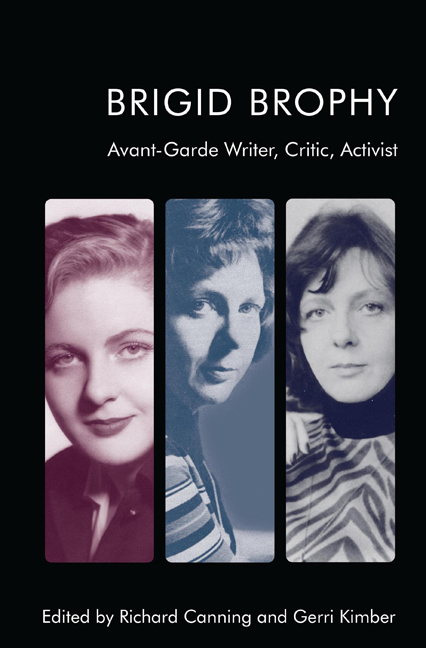Book contents
- Frontmatter
- Contents
- List of Illustrations
- Acknowledgements
- Introduction
- 1 Embodying the Fragments: A Refl ection on the Reluctant Auto-Biography of Brigid Brophy
- 2 Brigid Brophy’s Paradoxical World of Childhood
- 3 Intr oduction to ‘The Librarian and the Novel’
- 4 The Librarian and the Novel: A Writer’s View
- 5 Penetrating (the) Prancing Novelist
- 6 ‘Shavian that she was’
- 7 ‘Il faut que je vive’: Brigid Brophy and Animal Rights
- 8 Brigid Brophy’s Phenomenology of Sex in Flesh and The Snow Ball
- 9 Letter to Brigid
- 10 Encoding Love: Hidden Correspondence in the Fiction of Brigid Brophy and Iris Murdoch
- 11 ‘Heads and Boxes’: A Prop Art Exhibition Collaboration by Brigid Brophy and Maureen Duffy
- 12 Prancing Novelist and Black and White: Experiments in Biography
- 13 ‘Mo nster Cupid’: Brophy, Camp and The Snow Ball
- 14 ‘A Felicitous Day for Fish’
- 15 The Dissenting Feminist
- 16 A Certain Detachment?
- Notes on Contributors
- Index
9 - Letter to Brigid
Published online by Cambridge University Press: 17 October 2020
- Frontmatter
- Contents
- List of Illustrations
- Acknowledgements
- Introduction
- 1 Embodying the Fragments: A Refl ection on the Reluctant Auto-Biography of Brigid Brophy
- 2 Brigid Brophy’s Paradoxical World of Childhood
- 3 Intr oduction to ‘The Librarian and the Novel’
- 4 The Librarian and the Novel: A Writer’s View
- 5 Penetrating (the) Prancing Novelist
- 6 ‘Shavian that she was’
- 7 ‘Il faut que je vive’: Brigid Brophy and Animal Rights
- 8 Brigid Brophy’s Phenomenology of Sex in Flesh and The Snow Ball
- 9 Letter to Brigid
- 10 Encoding Love: Hidden Correspondence in the Fiction of Brigid Brophy and Iris Murdoch
- 11 ‘Heads and Boxes’: A Prop Art Exhibition Collaboration by Brigid Brophy and Maureen Duffy
- 12 Prancing Novelist and Black and White: Experiments in Biography
- 13 ‘Mo nster Cupid’: Brophy, Camp and The Snow Ball
- 14 ‘A Felicitous Day for Fish’
- 15 The Dissenting Feminist
- 16 A Certain Detachment?
- Notes on Contributors
- Index
Summary
Dear Brigid,
Forgive me writing after all these years. It is a letter I wanted to write many years ago. I remember so clearly when you entered my life in October 1971 – going on for half a century ago.
I was in my first term at Cambridge University. I was lost and bewildered, anxious about my sexuality, sexual orientation, and struggling with my then Christian faith and generally confused about what I believed in. Cambridge felt an alien environment and my home life, as the only child of a mentally ill, alcoholic mother and a distant father, felt even more alien.
From an early age I have taken refuge in public libraries. The city centre library felt so much more inviting than what Neville Chamberlain was reputed to have called ‘this magnificent erection’ – Giles Gilbert Scott's University Library. On the returned book trolley was a collection of essays and reviews called Don't Never Forget by an author who, at that stage, I was unfamiliar with. I suspect you were considered too ‘racy’ for my English public-school library.
It changed my life. I was predisposed to like it. I was already a vegetarian and a devotee of Mozart. I had spent my teens obsessed by the English Aesthetic Movement. I adored Beardsley (my parents had bought me a monograph of the complete Beardsley drawings to celebrate my entrance Exhibition to Cambridge). I had also loved Wilde since an enlightened (and possibly lavender-inclined) English master had read The Ballad of Reading Gaol out loud to us, as an alternative to the set text (possibly one of your Fifty Works of English Literature We Can Do Without). From the age of 13, after a colonial childhood, my family home was in raffish 1960s Brighton, which has always felt a Brophy kind of town with its fantastical Nash Pavilion. It was only a matter of time before I would ‘discover’ you.
- Type
- Chapter
- Information
- Brigid BrophyAvant-Garde Writer, Critic, Activist, pp. 137 - 142Publisher: Edinburgh University PressPrint publication year: 2020



